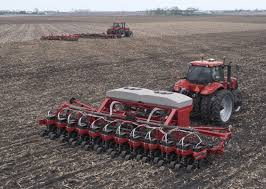One of the most important decisions growers make every year is the selection of planting populations for both corn and soybeans. In both cases growers want to save seed costs, but still maximize yields. Each crop responds differently to raising or lowering populations. Here’s a look at choosing the proper population for soybeans.
Soybeans respond very differently  than corn to population changes. In lower-producing fields under tough conditions, we recommend planting soybeans at a higher population. This is the opposite of corn, where often lower populations are utilized on less productive soils. Our Soybean Planting Rates chart shows our recommendations for both untreated seed and soybeans with seed treatment. Soybeans are very forgiving on populations. Generally, you will not see yield drops until you get well below 100,000 plants per acre.
than corn to population changes. In lower-producing fields under tough conditions, we recommend planting soybeans at a higher population. This is the opposite of corn, where often lower populations are utilized on less productive soils. Our Soybean Planting Rates chart shows our recommendations for both untreated seed and soybeans with seed treatment. Soybeans are very forgiving on populations. Generally, you will not see yield drops until you get well below 100,000 plants per acre.
 Selecting the appropriate planting population is especially important this year because seed suppliers in the Midwest are experiencing lower germination rates on many of their lots of seed. This is due to much of the Midwest’s soybean crop experiencing unusually wet weather and a long, delayed harvest. These conditions hurt final soybean seed quality despite having overall high production.
Selecting the appropriate planting population is especially important this year because seed suppliers in the Midwest are experiencing lower germination rates on many of their lots of seed. This is due to much of the Midwest’s soybean crop experiencing unusually wet weather and a long, delayed harvest. These conditions hurt final soybean seed quality despite having overall high production.
Nathan Kleczewski, Extension Field Crop Plant Pathologist at the University of Illinois, discussed “Seed Quality Issues a Concern in 2019 Soybeans” in his blog. And every seed supplier checked germination of every bin of seed stored on farm before deciding to accept it as a seed lot.
Every box and bag of soybean seed lists the germination rate. The percent germination we print at Burrus is always lower than the worst germ sample noted on that lot of seed. Germination rates will require special attention during this year’s planting season. If a grower is planting a soybean variety that came with a germination rate below 85 percent, we recommend raising the standard planting rate by the difference between the germination rate and 85. For example, if a variety is rated 80% germination, raise the planting rate by 5 percent.
There are a lot of things to keep in mind when setting your planting populations. If the worst-case scenario occurs and you experience poor emergence conditions, check with your seed dealer about the availability of a replant guarantee. Be sure to ask what comes with the guarantee and see if you can get seed treatment or technology fees covered on the replant.


 and then
and then